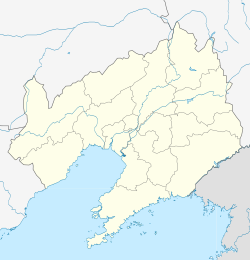Beizhen
Beizhen
北镇市 | |
|---|---|
 Location in Jinzhou | |
| Coordinates: 41°36′N 121°48′E / 41.600°N 121.800°E | |
| Country | People's Republic of China |
| Province | Liaoning |
| Prefecture-level city | Jinzhou |
| Area | |
| • County-level city | 1,782.0 km2 (688.0 sq mi) |
| • Urban | 78.80 km2 (30.42 sq mi) |
| Elevation | 64 m (210 ft) |
| Population (2017)[1] | |
| • County-level city | 495,000 |
| • Density | 280/km2 (720/sq mi) |
| • Urban | 154,800 |
| Time zone | UTC+8 (China Standard) |
Beizhen (simplified Chinese: 北镇; traditional Chinese: 北鎭; pinyin: Běizhèn) is a city in west-central Liaoning province of Northeast China. It is under the administration of Jinzhou City.
History
[edit]In 1123, the Jin Dynasty set Guangning County (Chinese: 廣寧縣) in nowadays Beizhen. In Ming Dynasty, the town of Guangning became a base of the Ming troops in Liaotung and a prosperous border trading center. In 1913, the name was changed to Beizhen, which is an alternative name of the Yiwulü Mountain, literally meaning "the guarding mountain of the North".[2] In 1995, Beizhen County became Beining City (北寧市), the name of which is later changed to the current name.
Administrative divisions
[edit]
There are three subdistricts, 14 towns, and six townships under the city's administration.[3]
Subdistricts:
- Beizhen Subdistrict (北镇街道), Guangning Subdistrict (广宁街道), Guanyin'ge Subdistrict (观音阁街道)
Towns:
- Dashi (大市镇), Zheng'an (正安镇), Zhong'an (中安镇), Luoluobao (罗罗堡镇), Changxingdian (常兴店镇), Lüyang (闾阳镇), Goubangzi (沟帮子镇), Liaotun (廖屯镇), Qingduizi (青堆子镇), Gaoshanzi (高山子镇), Zhaotun (赵屯镇)
Townships:
- Futun Township (富屯乡), Baojia Township (鲍家乡), Datun Township (大屯乡), Liujia Township (柳家乡), Wucheng Township (吴家乡), Liaocheng Township, Beizhen (辽城乡)
Climate
[edit]| Climate data for Beizhen (1991–2020 normals) | |||||||||||||
|---|---|---|---|---|---|---|---|---|---|---|---|---|---|
| Month | Jan | Feb | Mar | Apr | May | Jun | Jul | Aug | Sep | Oct | Nov | Dec | Year |
| Mean daily maximum °C (°F) | −3.0 (26.6) |
1.1 (34.0) |
8.0 (46.4) |
16.8 (62.2) |
23.6 (74.5) |
26.9 (80.4) |
28.7 (83.7) |
28.5 (83.3) |
24.7 (76.5) |
16.9 (62.4) |
6.4 (43.5) |
−1.2 (29.8) |
14.8 (58.6) |
| Daily mean °C (°F) | −8.4 (16.9) |
−4.4 (24.1) |
2.4 (36.3) |
10.8 (51.4) |
17.7 (63.9) |
21.9 (71.4) |
24.5 (76.1) |
23.8 (74.8) |
18.9 (66.0) |
11.1 (52.0) |
1.3 (34.3) |
−6.2 (20.8) |
9.4 (49.0) |
| Mean daily minimum °C (°F) | −12.8 (9.0) |
−9.1 (15.6) |
−2.5 (27.5) |
5.4 (41.7) |
12.1 (53.8) |
17.2 (63.0) |
20.7 (69.3) |
19.8 (67.6) |
13.7 (56.7) |
5.9 (42.6) |
−3.1 (26.4) |
−10.4 (13.3) |
4.7 (40.5) |
| Average precipitation mm (inches) | 2.6 (0.10) |
3.2 (0.13) |
8.2 (0.32) |
26.2 (1.03) |
52.6 (2.07) |
88.3 (3.48) |
172.4 (6.79) |
142.6 (5.61) |
44.5 (1.75) |
29.6 (1.17) |
13.9 (0.55) |
2.8 (0.11) |
586.9 (23.11) |
| Average precipitation days (≥ 0.1 mm) | 1.8 | 1.9 | 3.2 | 5.3 | 8.1 | 10.5 | 10.7 | 9.8 | 5.9 | 5.0 | 3.2 | 2.0 | 67.4 |
| Average snowy days | 2.4 | 2.8 | 2.5 | 0.7 | 0 | 0 | 0 | 0 | 0 | 0.2 | 2.5 | 2.5 | 13.6 |
| Average relative humidity (%) | 48 | 46 | 43 | 45 | 52 | 68 | 79 | 77 | 64 | 56 | 52 | 50 | 57 |
| Mean monthly sunshine hours | 209.0 | 205.7 | 247.4 | 244.1 | 271.6 | 229.5 | 202.5 | 223.7 | 237.6 | 225.0 | 187.8 | 189.9 | 2,673.8 |
| Percent possible sunshine | 70 | 68 | 67 | 61 | 60 | 51 | 44 | 53 | 64 | 66 | 64 | 67 | 61 |
| Source: China Meteorological Administration[4][5] | |||||||||||||
References
[edit]- ^ a b Ministry of Housing and Urban-Rural Development, ed. (2019). China Urban Construction Statistical Yearbook 2017. Beijing: China Statistics Press. p. 50. Archived from the original on 18 June 2019. Retrieved 11 January 2020.
- ^ Hao Yaofu (郝瑤甫) (1984). 东北地方志考略. Liaoning People's Press (辽宁人民出版社. p. 87.
- ^ 锦州市
- ^ 中国气象数据网 – WeatherBk Data (in Simplified Chinese). China Meteorological Administration. Retrieved 5 October 2023.
- ^ 中国气象数据网 (in Simplified Chinese). China Meteorological Administration. Retrieved 5 October 2023.
External links
[edit]

